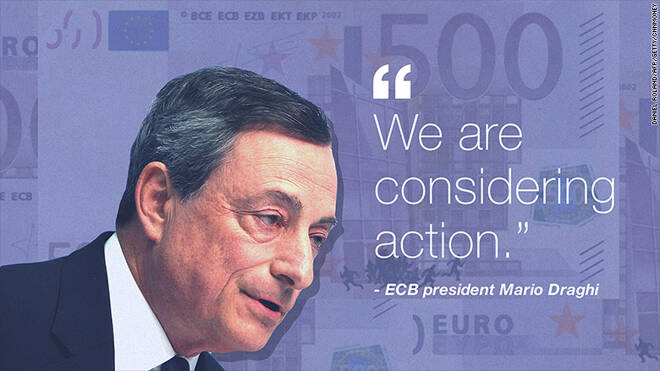Advertisement
Advertisement
Draghi Cure Too Little Too Late
By:
Even though the world is creeping out of its economic doldrums, Mario Draghi and the ECB have been little to no help. Their attitude over the past years
Even though the world is creeping out of its economic doldrums, Mario Draghi and the ECB have been little to no help. Their attitude over the past years was a wait and see month after month as Mario Draghi tried to manipulate markets and economies with promises and threats. In the past 18 months the central bank has finally taken some actions, which seems to be too little too late. Instead of applying a bandage immediately the ECB waited until the wound was infected. As citizens of the Eurozone become more and more disillusioned as their savings and life hopes are smashed the central bank still calls for patience. Patience the watchword as March ECB decisions still being rolled out. The ECB focus now is on implementation of previous decisions not on further action. Draghi says easy policy will take much time to boost growth and inflation. And he is correct in this statement. The question that remains is why did he wait so long to roll it out. The ECB policy stance is supporting moderate recovery but risks remain to downside. So, forward guidance emphasizes accommodative policy to be ‘preserved’ with policy rates here or lower for ‘extended time’. Further ECB easing possible ‘if warranted’ but Draghi downplayed its likelihood. ECB facing difficult questions as to whether it could or should ease further.
There was little market reaction to his pronouncements at the ECB’s regular press conference. The fact that the ECB had announced a significant number of major policy initiatives at its previous policy meeting just six weeks ago was good enough reason for Mr Draghi to look for yesterday’s press conference to pass without much notice. However, his desire not to have his comments attract attention was made altogether greater by the adverse financial market reaction to the March policy changes and, more particularly, to the press conference that elaborated on them. Although the ECB launched a major easing in March, the firming in market interest rates, sell‐off in equity markets and rise in the exchange rate of the EURO that immediately followed Mr Draghi’s pronouncements was more typical of the traditional response to a tightening rather than a loosening of policy. The key driver was the market interpretation that some comments made by Mr Draghi at the press conference that explained the March decision might be signaling the era of ECB easing could be drawing to a close.
Could you just imagine where growth would be if Draghi had stated his policy of easing as far back as 2012? When a doctor sees a patient with a disease he comes up with a plan to fight this cancer which usually starts with a less aggressive treatment in the hopes that it might work and avoid drastic measures, but there is a final determining point when the professional needs to decide to change his course of treatment to save his patients life even if it requires his risk treatments. The doctor’s responsibility is to advise and act on his patients’ condition and to make the hard choices to preserve life. The question is did Mario Draghi miss the turning point. Did his caution let the patient’s condition worsen so drastically that the new treatment will be longer and less likely to succeed? If Draghi was a doctor he might be open to a lawsuit for malpractice, he cured the cancer but the patient died.
op
While Mr Draghi was suitably low key in his remarks on Thursday he clearly repeated the ‘corrective’ tone of a range of various ECB comments made in the wake of the market reaction to the March press conference. He emphasized both the ECB’S confidence that, given time, its current policy stance should deliver an improvement in activity and inflation as well as its commitment to ease further ‘if warranted…using all the instruments available within its mandate’. Lest there was any doubt, he also placed a heavy emphasis on the word ‘all’ when repeating this wording in response to a question at his press conference.
The ECB is now in a very awkward position in which it will likely seek to resist any externally driven tightening in financial conditions in the Euro area while any further downgrading of the outlook to either inflation or activity may prompt calls for further easing that the ECB may find as difficult to resist as to implement.
About the Author
Barry Normanauthor
Advertisement
